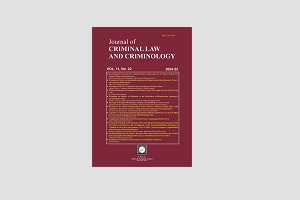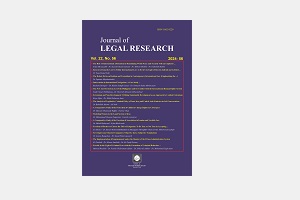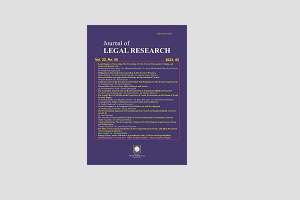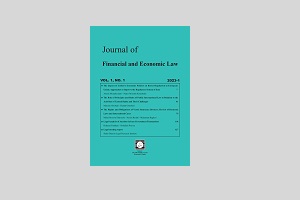Journal of
Criminal Law and Criminology
Number 3
Vol. II ● No. 1
Spring – Summer 2014
Managing Editor: Vahid Eshtiagh
Editor-in-Chief: Mohammad Ashoori
CONTENTS
Articles
The Principle of Conduct and Its Rules in Criminal Law: with a Comparative Approach to Iran and England law
Mehrdad Rayejian Asli
Iran criminal law mechanisms in enforcement of litigation right for victimized child (child`s litigation right)
Amirhamzeh Zeinali
The Elements of Sin Aiding
Ghassem Mohammadi – Ehsan Abbaszadeh
Similarities and Differences between Interpretation in Substantive and Procedural Law
Ali Shojaei
Assessment of Criminal Sanctions against Legal Persons Analysis of the Article 20 of the Islamic Penal Code Adopted (2013)
Mohsen Sharifi – Mohammad Jafar Habibzadeh – Mohammad Farajiha
Political Crime and Had-Tazir Demarcation
Rahim Nobahar
Articles
The Principle of Conduct and Its Rules in Criminal Law: with a Comparative Approach to Iran and England law
Mehrdad Rayejian Asli
(Assistant Professor of Tarbiat Modares University)
Abstract:
The principle of conduct, as a basic principle, is as the actus reus in
a model which can be called criminal law theory. The theory explains
the relations among manifestations of criminal norm based upon a hierarchical
model in which the conduct as objective aspect of free choice
is analyzed into several rules from which each one derive specific provisions.
These render the norms constituting criminal conduct become
applicable in any criminal cases. The rules derived from the principle
of conduct are divided into three groups: rules of the nature of conduct,
rules of requirements and circumstances of conduct, and rules of consequence
of conduct. All of the rules reflect similarities and differences
within comparative criminal law systems. The cases concerned in
this article are Iranian and English legal systems. The article concludes
that although the classical concept actus reus can be formulated as the
principle of conduct in both legal systems but the rules and specific
provisions derived from reflect significant differences between the Iran
and England law: Whereas these rules and provisions have mainly been
incorporated into within Iranian law from other legal systems (esp. European-
French ones), there is an organized system of the norms constituting
conduct within England law.
Keywords:
Criminal law, Criminal norm, Principle of conduct, rules and provisions
of conduct principle
Iran Criminal Law Mechanisms in Enforcement of Litigation Right for Victimized Child (Child`s Litigation Right)
Amirhamzeh Zeinali
(Member of Social Welfare management Reserch Centre, University of Social
Welfare and Rehabilitation Sciences, Tehran, Iran)
Abstract:
According to the principle 36 of Iran Constitutional law, everyone has
the right of litigation. Everyone can access proper courts for litigation.
These courts must be available for everyone and nobody can`t be denied
from resorting to the court which is accessible according to the law. All
of terms that has been used in this principle, are absolute and unconditional.
So, the primary principle is that disability is not a barrier in this
way. But enforcement of this right in some groups such as children and
adolescents can be faced with some barriers because of special physical
and social situations. This is an important matter in crimes against
child because of major impacts of victimization and social and humane
necessities in supporting victimized children. Although being a child
is not a barrier to litigation right when a child is victimized, legislators
by attending to the vulnerability of child in bringing criminal action
and for reducing black figure of crimes against them, have provided
some differential supportive mechanisms in enforcement of this right
by adopting welfare approach. This matter has been provided in criminal
procedure law (1392) that is one of the most victim-focused in Iran
criminal laws. Reviewing this Act and comparing it with the other laws
and legislations in this area such as Child Protection Act (16/12/2002,
other Acts and ongoing bills present the disharmony, conflict and confusion
in legislative policies in this field. This essay reviews mentioned
matters in descriptive- analytical approach and by use of comparative
law findings.
Keywords:
Victimized child, prosecutor, litigation, legal guardian, Nongovernmental
organization, wellbeing organization, Guardian by nature.
The Elements of Sin Aiding
Ghassem Mohammadi
(Assistant Professor of Shahid Beheshti University)
Ehsan Abbaszadeh
(Ph.D Student)
Abstract:
The prohibition of sin aiding as jurisprudential basis of criminalization
of aiding in crime has always been considered. The order of Shari’a
in crime aiding and the quality of its creation has several similarities
to crime aiding. While more accurate inquiry on material and mental
elements show that the substance of sin aiding and it’s partial subjects
are not necessarily accompanied by crime aiding theory. On one side,
the recognition of the aiding examples which is based on achieving
common perception of “aiding” in return of considering legal examples
of aiding, will lead to not considering some behaviour as jurisprudential
aiding unlike law’s perspective. On the other side, acceptance of
knowledge adequacy to the content of action theory,in creation of material
element of aiding, will make distinguished approach that can be
observed in criminal laws.
Keywords:
Sin(Ethm) aiding, Practical aiding, Intentional titles, Crime, Common
truth of aiding.
Similarities and Differences between Interpretation in Substantive and Procedural Law
Ali Shojaei
(Assistant Professor of Islamic Azad University, Islamshahr Branch)
Abstract:
Substantive and procedural criminal laws have no differences in relation
to interpretive approaches and general canons of interpretation.
They also have no differences in these respects with other legal branches.
There are two special canons of interpretation (i.e., strict interpretation
and interpretation in favor of the accused), which although they
have a common core in both substantive and procedural criminal law,
their applications are not the same. The strict interpretation could be
defined as interpretation limiting the right-breaking. The principle of
legality and fair trial are respectively the focal concepts in substantive
and procedural criminal law. So, the canon of strict interpretation in
substantive and procedural criminal law could be respectively defined
as interpretation “based on” or “compatible with” the principle of legality
and as interpretation “based on” or “compatible with” fair trial. The
canon of interpretation in favor of the accused has a completing role for
the canon of strict interpretation and is the last chain of the interpretive
process in substantive criminal law. This canon has, in the light of the
principle of balancing the rights, a broader scope in procedural criminal
law than in substantive criminal law and is manifested as the canon
of favor-based interpretation, which is subdivided into three canons,
i.e., interpretation in favor of the accused, interpretation in favor of the
crime victims and interpretation in favor of the society.
Keywords:
Interpretation, interpretive approaches, canons of interpretation, the
principle of legality, fair trial, the canon of strict interpretation, the canon
of interpretation in favor of the accused, the canon of favor- based
interpretation.
Assessment of Criminal Sanctions against Legal Persons; (the analysis of the Article 20 of the Islamic Penal Code ratified in 2013)
Mohsen Sharifi
(Ph.D Student)
Mohammad Jafar Habibzade (Ph.D)
(Professor, Faculty of Low and Political Science, Tarbiat Modares University)
Mohammad Farajiha
(Assistant Professor of Tarbiat Modares University)
Abstract:
Inadequacy of the civil and disciplinary sanctions to control the riskful
activities of the modern powers such as legal entities ultimately
made the Iranian legal system to move beyond the sparse and case law,
and recognize the criminal liability of those individuals, as a rule in
the Islamic Penal Code (Article 143; ratified in 2013). Obviously, the
effectiveness of this approach depends on the integrity of the sanctions
commensurate with the culpability of legal entities. Therefore, it must
be assessed whether or not the designed sanctions- dissolution, confiscation
of property, prohibition of occupational or social activities,
capital raising, prohibition of issuing some trade documents, fine and
publishing sentence (Article 20)- are equivalent to the legal entities nature.
Does the diversity of these reactions in a way that they can cope
with crime control among these persons? Do the sanctions meet the
particular goals of punishment such as deterrence and victim’s redress
losses? And is there any separation among the sanctions with regard to
the legal entities types (public or private being)? According to the present
essay, the predicted sanctions are proportionate to the nature of the
legal entities, but their diversity is relative. The remedial goals of the
punishment and support the victim is more likely to be met than other
objectives. Also, despite the separation between legal entities, there is
no distinguished separation between the sanctions.
Keywords:
Legal persons, Goals, Penalties, Criminal sanctions variety, Appropriateness
of criminal sanctions.
Political Crime and Had -Tazir Demarcation
Rahim Nobahar
(Assistant Professor of Shahid Beheshti University)
Abstract:
In Islamic Penal Law crimes and punishments are divided intohodoud
(prescribed punishments) and ta’zirat (discretionary punishments).
It is, sometimes, believed that political crime, in its modern sense, is
recognizable only in hodoud, not ta’zirat. The major part of the problem
according to this view seems to be that the recognition of a crime
as political requires some changes and mitigationsin the punishment;
while the quality and quantity of the punishment inhodoud are supposedly
predetermined. This article studies arguments in favor of this idea
and evaluate them as insufficient. Rather the article argues that at least
some hodoud are recognizable as political crimes in certain cases due
to their nature andsubstance. The article also provides some arguments
in favor of differentiation between professional criminals and offenders
with political motives. Even in traditional view, this differentiation has
had role in separation of some crimes from one another. This idea can
be developed for recognition of political crimes in its modern sense not
only in ta’zirat, but in some hodoud as well.
Keywords:
Islamic Jurisprudence, Had -Ta’zir, Political Crime.





